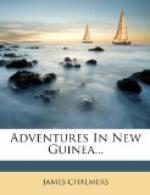In the afternoon we held service in the main street. The singing attracted a very large and noisy crowd but when our old friend began to pray it was as if a bomb-shell had exploded, men, women, and children running as for dear life to their homes. Another hymn brought them back, armed and unarmed. We had a long talk on peace, and they wished I would go with them to Moveave, and make peace. One division of these villages they have simply wiped out. I asked them to leave Moveave alone, and when a fit season comes I will ascend the river with them, and make peace.
I have visited the party who last week killed several of the Moveavans, and they promised not to attack them again. The Kaback jewellery is about in abundance.
Semese spoke nearly all the night through, exhorting all to peace, and that now we had visited them they ought no more to go about exalting themselves, fighting with their neighbours, and speaking evil of their friends, the Motuans. Rahe has brought his son, whom he has named Tamate. I have no doubt he will be an expensive honour.
We went up the William River to-day. At mouth, on the west side, are two islands, viz., Iriho and Biaveveka. Between the latter and the mainland is an entrance into Alice Meade Harbour. The river is broad and deep. Both banks are lined with sago palms.
When a young man marries a young woman, the custom here is to pay nothing for her; but for a widow something very great. The people live chiefly on sago. Sago is cooked with shell-fish, boiled with bananas, roasted on stones, baked in the ashes, tied up in leaves, and many other ways. We have received large presents of sago, both boats bearing as much as is safe to carry. We leave in the morning. At present a man is going through the streets in great wrath, having been to his plantation and missed a bunch of bananas. As he moves along he shouts out his loss, and challenges the thief.
We had a gathering of old men until late into the night, and they closed with a wail, chanted, with drums keeping time. Hours before daylight Semese was up, waiting for me to turn out.
We had a fine run back to Yule, where, at sunset, we were met by a terrific gale of wind and a thunderstorm. We had to put in close to the land, and for four hours sit it out in a deluge of rain. It was soon inky dark, the lightning very vivid, and the thunder deafening. Piri’s boat anchored close alongside. On the weather clearing up a little, we crossed Hall Sound to Delena, where we were soon met by natives carrying torches, and were led to their houses. A change of clothing, and we were all as comfortable as possible.
We spent the hour of midnight with Kone and Levas, chiefs of Delena, telling them of our visit to the west, and its success in establishing peace. They were greatly delighted, and will do me the honour of visiting me at Port Moresby, that is, will relieve me of some tomahawks. With a light wind and a smooth sea, we had a pleasant run to Boera, where we arrived at sunset. There was great joy in the village at our arrival.




